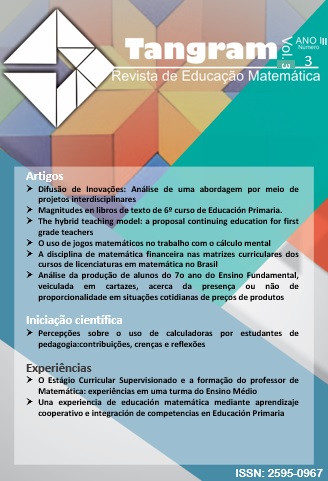The discipline of Financial Mathematics in the curricular matrices of undergraduate courses in Mathematics in Brazil
DOI:
https://doi.org/10.30612/tangram.v3i3.11509Keywords:
Degree in Mathematics. Financial Math. Pedagogical Projects of Courses.Abstract
In this research, we aim to understand how the discipline of Financial Mathematics is structured in the Pedagogical Projects of Courses (PPCs) of undergraduate courses in Mathematics and suitable for the future practice of the teacher. Weadopted as methodology, a qualitative approach of the documental type, whose corpus was constituted by 182 PPCs of courses, of all the geographic regions of Brazil. Data analysis was performed through Content Analysis, which made it possible to establish two categories of analysis. Discussing the categories, we highlight the need for mathematics degrees to take on the responsibility of training qualified teachers, contemplating knowledge associated with the development of the basic school education process. We hope that this study can contribute to the debate on the curriculum of initial teacher education and that it transcends teaching, which is purely technical, which overvalues teaching froma transmissive perspective of concepts to the detriment of the construction of scientific knowledge.Downloads
References
Appolinário, Fabio. (2009). Dicionário de metodologia científica: um guia para a produção de conhecimento científico. São Paulo: Atlas.
Bardin, Laurence. (1977). Análise de Conteúdo. Lisboa: Edições 70.Brasil. Ministério da Educação. Conselho Nacional de Educação. (2002). Parecer CNE/CP 2, de 17 de janeiro de 2002. Institui a duração e a carga horária dos cursos de licenciatura, de graduação plena, de formação de professores da educação básica em nível superior. Diário Oficial da União, Brasília, Seção 1, p. 9.
Diniz-Pereira, Júlio Emílio. (2000). Formação de professores: pesquisas, representações e poder. Belo Horizonte: Autêntica.
Gatti, Bernardete Angelina; Barretto, Elba Siqueira de Sá; André, Marli Elisa Dalmazo de Afonso (2011). Políticas docentes no Brasil: um estado da arte. Brasília: UNESCO.
Gonçalves, Tadeu Oliver; Gonçalves, Terezinha Valim Oliver. Reflexões sobre uma prática docente situada: buscando novas perspectivas para a formação de professores. In: Geraldi,Corinta Maria Grisolia; Fiorentine, Dário; Pereira, Elisabete Monteiro de Aguiar (Org.). (1998). Cartografias do Trabalho Docente: professor (a)-pesquisador(a). Campinas, SP: Mercado das Letras: Associação de Leitura do Brasil.
Silveira, Denise Tolfo; Córdova, Fernanda Peixoto. A Pesquisa Científica. In: Gerhardt, Tatiana Engel.; Silveira, Denise Tolfo. (Org). (2009). Métodos de Pesquisa. Porto Alegre, RS: Editora da UFRGS, p.31-42.
Downloads
Published
How to Cite
Issue
Section
License
Authors must accept the publication rules when submitting the journal, as well as agree to the following terms:
(a) The Editorial Board reserves the right to make changes to the Portuguese language in the originals to maintain the cultured standard of the language, while respecting the style of the authors.
(b) Authors retain the copyright and grant the journal the right to first publication, with the work simultaneously licensed under the Attribution-NonCommercial-ShareAlike 3.0 Brazil (CC BY-NC-SA 3.0 BR) that allows: Share - copy and redistribute the material in any medium or format and Adapt - remix, transform, and create from the material. CC BY-NC-SA 3.0 BR considers the following terms:
- Attribution - You must give the appropriate credit, provide a link to the license and indicate whether changes have been made. You must do so under any reasonable circumstances, but in no way that would suggest that the licensor supports you or your use.
- NonCommercial - You may not use the material for commercial purposes.
- Sharing - If you remix, transform, or create from material, you must distribute your contributions under the same license as the original.
- No additional restrictions - You may not apply legal terms or technological measures that legally restrict others from doing anything that the license permits.
(c) After publication, authors are allowed and encouraged to publish and distribute their work online - in institutional repositories, personal page, social network or other scientific dissemination sites, as long as the publication is not for commercial purposes.






